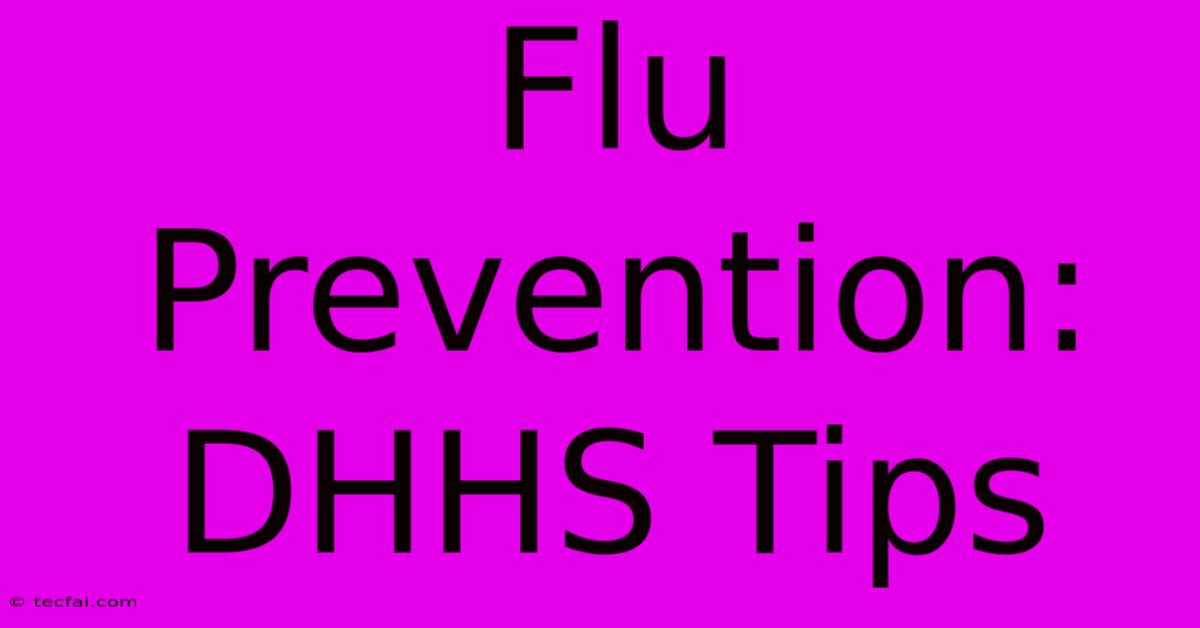Flu Prevention: DHHS Tips

Discover more detailed and exciting information on our website. Click the link below to start your adventure: Visit Best Website tecfai.com. Don't miss out!
Table of Contents
Flu Prevention: DHHS Tips for a Healthy Season
The dreaded flu season. Every year, millions suffer from influenza, leading to missed work, school, and overall decreased quality of life. But it doesn't have to be this way. The Department of Health and Human Services (DHHS) offers a wealth of information on preventing the flu, and this guide will distill their key recommendations into actionable steps you can take to protect yourself and your loved ones.
Understanding the Flu: Why Prevention Matters
Before diving into prevention strategies, it's crucial to understand what the flu is and why prevention is so vital. Influenza is a contagious respiratory illness caused by influenza viruses. These viruses attack your respiratory system, leading to symptoms like fever, cough, sore throat, muscle aches, and fatigue. While many recover within a week or two, the flu can lead to serious complications, particularly for high-risk groups like young children, older adults, and individuals with chronic health conditions. Prevention is our best defense against the potentially debilitating effects of the flu.
DHHS-Recommended Flu Prevention Strategies: A Comprehensive Guide
The DHHS emphasizes a multi-pronged approach to flu prevention, combining several key strategies for maximum effectiveness. Let's break down these crucial steps:
1. Vaccination is Key: The DHHS strongly recommends annual influenza vaccination for everyone six months and older. The vaccine is the single most effective way to protect yourself from the flu and reduce the severity of illness if you do get sick. Vaccination reduces the likelihood of spreading the flu to others, protecting vulnerable populations. Talk to your doctor about which vaccine is right for you.
2. Practice Excellent Hygiene: This simple yet powerful strategy is at the forefront of DHHS recommendations.
- Handwashing: Wash your hands frequently with soap and water for at least 20 seconds, especially after coughing, sneezing, or being in public spaces. If soap and water aren't available, use an alcohol-based hand sanitizer with at least 60% alcohol.
- Cover your coughs and sneezes: Always cover your mouth and nose with a tissue or your elbow when coughing or sneezing. This helps prevent the spread of respiratory droplets that contain the flu virus.
- Avoid touching your face: Your hands can carry the flu virus, so avoid touching your eyes, nose, and mouth.
3. Maintain Social Distancing When Necessary: During peak flu season, consider limiting close contact with people who are sick. If you are feeling unwell, stay home to avoid spreading the virus to others.
4. Stay Healthy: A strong immune system is your best defense.
- Get enough sleep: Aim for 7-8 hours of quality sleep each night.
- Eat a balanced diet: Nourish your body with fruits, vegetables, and whole grains.
- Manage stress: Chronic stress can weaken your immune system. Find healthy ways to manage stress, such as exercise or meditation.
5. Consider Antiviral Medications: While not a preventative measure in the same way as vaccination, antiviral medications can be used to treat the flu and reduce its severity. Consult your doctor if you think you might have the flu.
Staying Informed: Your Role in Flu Prevention
The information provided by the DHHS is constantly updated as new research emerges. Staying informed is crucial for effective flu prevention. Regularly check reputable sources for the latest recommendations and updates on flu activity in your area.
By diligently following these DHHS-recommended strategies, you can significantly reduce your risk of contracting the flu and contribute to a healthier community. Remember, prevention is the best medicine, and taking proactive steps can make a world of difference in protecting yourself and those around you.

Thank you for visiting our website wich cover about Flu Prevention: DHHS Tips. We hope the information provided has been useful to you. Feel free to contact us if you have any questions or need further assistance. See you next time and dont miss to bookmark.
Featured Posts
-
Microsoft 365 Addressing Outlook Teams Issues
Nov 26, 2024
-
50 Tumaas Ang Chill Guy Meme Coin
Nov 26, 2024
-
Lana Del Rey Announces Stadium Gigs
Nov 26, 2024
-
Ronaldos Al Nassr Edges Closer To Playoffs
Nov 26, 2024
-
Cargo Plane Crash Vilnius Airport
Nov 26, 2024
